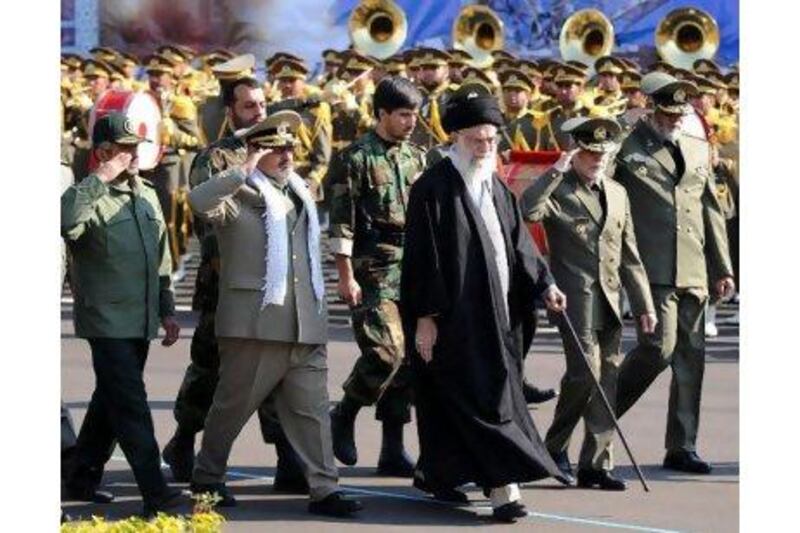Iran's supreme leader warned Israel and the US yesterday that his country "will respond with full force" to any military attack over its suspected nuclear programme.
Ayatollah Ali Khamenei said: "Iran is not a nation to sit still and just observe threats coming from straw powers which are being eaten by worms from inside." Iran's Revolutionary Guards, Basij militia and army will "answer attacks with strong slaps and steel fists".
His strident language followed threats from Israel last week that air strikes could be in the offing against Iran's nuclear facilities.
Pressure on Iran mounted this week when the UN's nuclear watchdog issued a detailed report that made clear Tehran conducted extensive research into building a nuclear weapon.
Iran responded defiantly to the claims by the International Atomic Energy Agency by vowing it would not budge "one iota" from its nuclear programme, which it insists is solely designed to generate electricity.
The exchange of bellicose rhetoric has alarmed influential Iranians at home and abroad who fear an attack on their country would wreck Iran's sanctions-hit economy and play into the hands of Tehran's divided ruling hardliners by provoking a wave of patriotic fervour.
Political repression ensuing from any military action would also be disastrous for Iran's battered pro-democracy movement and increase human-rights abuses, they said.
An attack on Iran's heavily-fortified nuclear facilities would even be welcomed by hard-line elements in the Iranian regime because it would help strengthen their grip on power, some argued. "War is the regime's lifeline. They depend on it. They can thrive in a war environment," said Fakhralsadat Mohtashamipour, a member of a reformist political party who has spent time in prison for her vocal support of other political prisoners.among them was her husband, Mostafa Tajzadeh, a former deputy interior minister under the presidency of Mohammad Khatami, Mr Ahmadinejad's popular reformist predecessor.
She was among 35 prominent civil-society figures inside Iran, ranging in age from 25 to 84, who spoke of their opposition to military action in interviews with the International Campaign for Human Rights in Iran (ICHRI), a New York-headquartered organisation.
Among them were lawyers, human-rights activists, journalists and writers, many of whom have faced censorship and even imprisonment for their opinions and activities.
One student activist told the ICHRI: "If war breaks out, democracy, human rights and civil society will be the main losers. The Iranian government would militarise and such a militaristic government has the potential to carry out widespread killings of opponents."
None of those interviewed believed an attack on Iran would precipitate "regime change", which some Washington hawks claim as an added incentive for striking at Iran's nuclear facilities. And none wanted Iran's dismal human-rights record used as a pretext to attack.
Most Iranian exiles, ranging from supporters of the domestic Green Movement opposition to leftist and liberal anti-government groups abroad, also oppose military action or further sanctions against their increasingly isolated homeland. Such measures, they say, would hurt ordinary Iranians who fear a return to the hardship they suffered during the devastating, eight-year war with Iraq in the 1980s.
One 56-year-old Tehrani woman told the US-funded Radio Free Europe/Radio Liberty that she could not sleep at night out of worry. And a man in the Iranian city of Isfahan said ordinary people would be the victims of any military action.
"People are the victims of sanctions. Iran's leaders are not suffering. People will bear the brunt of war," he told the radio channel.
More than 100 intellectuals and activists called this week on Iran to cooperate more with the UN's nuclear watchdog to prevent a pre-emptive attack.
"Democracy does not come from the barrel of a gun. We oppose military action against our country Iran based on any pretence, including concern over the regime's irresponsible nuclear activities," the group, mostly exiles, said in a statement.
"We strongly urge the Islamic Republic to cooperate with the International Atomic Energy Agency … to clear up ambiguities about its nuclear programme so there won't be any reasons for threats of war and destruction", the group said.
Trita Parsi, president of the National Iranian American Council, cautioned against underestimating Iranian nationalism.
"There's no doubt that this is a regime that is tremendously unpopular among the population, but that doesn't cancel out the forces of Iranian nationalism in the situation of an attack," he said in an interview.
Activists backing the Green Movement, battered by a crackdown after protests in 2009, also oppose military action. "Such an attack would cause instability both in Iran and the region and stop the normal trends towards democracy," said Ardeshir Amir Arjomand, an adviser to Iran's main opposition leader, Mirhossein Mousavi, who is under house arrest in Tehran.
Speaking to Reuters from France, he added: "Democracy cannot be manufactured abroad and exported."
[ mtheodoulou@thenational.ae ]
* With additional reporting by Reuters






